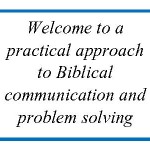This title, Blame Keeps Wounds Open, is an incomplete statement. The balance of the statement is: Only Forgiveness Heals.
The last article was concluded with the truism: The Bowl That Holds the Acid is Eaten by the Acid. This Acid can be un-resolved anger and/or un-resolved resentment. This Acid can also be un-forgiveness. And just as we saw anger is largely misunderstood so is forgiveness.
Blame can be described as continually ripping the scab off of a wound. Of course, the wound will continue to bleed.
Un-forgiveness, someone said, is drinking arsenic and waiting for the un-forgiven person to die.
Have you ever had, or heard, the following conversation?
“I’ll forgive you; but I’ll never forget,” quickly followed by the retort, “Well, if you don’t forget you are not forgiving!”
This premise is not true. We can forgive without forgetting. In fact, I don’t know that it is possible to forget anything although we are often prone not to have instant recall.
I see God as having designed humans this way. We need recall from the following five senses for both direction and protection.
The brain is fed by our five senses – hearing, seeing, feeling, smelling, and tasting.
In my 30+ years counseling I have found the bedrock of peoples problems are based in one or more of seven areas. For me, as a counselor, to learn what they are in an individuals life, I have counselees write a list of their un-resolve anger issues and resentments.
The seven areas are their, father, mother, family members, childhood experiences, school or job, marriage – theirs or marriage in general, and God.
Through prompting and provocation I have yet to have a case where the counselee(s) did not recall one or more things they had buried so deeply in their sub-conscious they no longer carried the incident in the conscious sphere of their memory.
Why? They were too painful to remember, i.e. to dwell on.
I say the mind has a mind of its own. Individuals can choose to remember or choose to block out the memory of things depending on the value or lack of value of that thought to that person.
What is the misunderstanding regarding offering forgiveness?
People wrongly believe if they say, “I forgive you,” they are in essence saying, “You are right and I am wrong.” But this is not so.
To say I forgive you is to acknowledge, I may never be able to forget what you have said or done to me, but I will not bring it up again nor hold it against you any longer.
Next time we will build on this principle.






